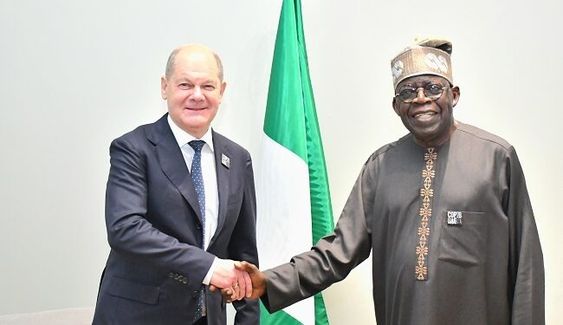Headlines
Power infrastructure agreement signed under the leadership of Tinubu and Scholz

On Friday in Dubai, United Arab Emirates (UAE), President Bola Tinubu and Chancellor Olaf Scholz oversaw the second signing of the Presidential Power Initiative (PPI) agreement between Nigeria and Germany, which is eventually intended to add 12,000 MW of energy to the national grid.
On the fringes of the United Nations Climate Conference (COP28), which was held at Expo City in Dubai, the agreement was signed.
The Managing Directors of Siemens AG’s Africa division, Nadja Haakansson, and Kenny Anue of the Federal Government of Nigeria Power Company.
Speaking on the deal, Anue again emphasised President Tinubu’s dedication to the growth of the electricity infrastructure, pointing out that he has stated repeatedly how important infrastructure development is to the current reforms.
He reiterated that financing and electricity are the core of the administration’s goal for economic change, adding that the PPI, with the help of partners Siemens Energy and financiers supported by the German government, by design incorporates both components.
Anue addressed the President, saying: “Mr. President, we aim to capitalise on or accelerate what was already a valuable programme in the Presidential Power Initiative through this accelerated agreement today. We are grateful for your strong and dynamic leadership through the Honourable Minister of Power.”
“The FGN Power Company was established as the special purpose vehicle for project implementation, one of the accomplishments made by the former federal government.”
He claimed that Siemens Energy has successfully supplied ten power transformer units and ten mobile substation units, and that the German government has nominated the required lead arrangers and financiers.
Joe Kaeser, the chairman of the Siemens Energy Supervisory Board, expressed his satisfaction that both sides could now move the process forward in his remarks, which traced the history of the initial agreement back to the Muhammadu Buhari government in 2018.
Speaking at the signing of the Presidential Initiative for Power today, he stated, “I’m really glad to be here since the former President Buhari asked me to come to Abuja in 2018 and tell him what we did in Egypt.
“And I said, Mr. President, that Nigeria has 200 million people, and Egypt has 80 million, so we could use 14 gigawatts.” Therefore, we might require additional gigawatts.
After five years, I’m glad that our agreement has elevated the spirit of supplying electricity for the benefit of the Nigerian people to a new height. I sincerely appreciate you doing that. And as we have seen tonight, good things do take time, as we say in Germany.
The PPI’s goal, according to Power Minister Adebayo Adelabu, is to add 12,000 MW of electricity to the country’s grid.
He stated that following the agreement on Friday, the process will move quickly to guarantee Nigerians a steady supply of electricity.
He stated: “We have not really made any substantial progress towards carrying out the contract that was signed in 2018 due to a number of variables, some of which were human, some of which were natural, and some of which were procedural. Of course, we understood that there were a lot of delays between 2018 and now.
Additionally, COVID struck in 2020, which hindered the project’s progress. However, it now demonstrates that we are prepared to proceed with the Siemens initiatives.
It demonstrates the governments of both nations’ determination to go forward with this project, which will, in our opinion, significantly enhance Nigeria’s power sector’s performance.
The goal of this agreement is to stabilise the entire transmission grid in Nigeria’s power industry from end to end, which will eventually improve the regularity, functionality, and affordability of the country’s power supply in the years to come.
“That we can sign this deal tonight makes us very delighted. Additionally, there will be a lot going on with the Presidential Power Initiatives project during the next few months.
Regarding the financial ramifications, he disclosed that the project will be funded through the government export credit facility that is being given to Nigeria by a few German banks.
“The original agreement we had was for $2.3 billion,” he continued. However, what we already have—roughly $60 million—relates to the importation of the 10 electricity mobile substations and transformers that Siemens supplied to the nation.
“These transformers are currently being installed, and they have been put into service. We have already spent $60 million on it.
Attorney General of the Federation Lateef Fagbemi, Minister of Aviation Festus Keyamo, Power Adelabu, Environment Balarabe Lawal, Transportation Said Alkali, Industry, Trade and Investment Dr. Dorris Anite, and Agriculture Abubakar Kyari were among the Nigerian officials present at the occasion.
